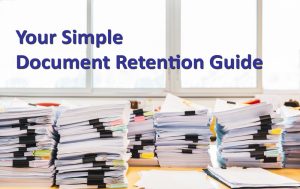Curated by eBizDocs
By Alexis Logsdon, MissionBox editorial
 Document Retention: A Simple Guide
Document Retention: A Simple Guide
Every organization (regardless if they are for profit or nonprofit) has document retention requirements. While this guide targets nonprofits, a large portion of this information also applies to for-profit businesses and government agencies. Using an electronic document management system can help you efficiently enforce document retention requirements without all the complexities of managing paper documents.
Do you know how long to retain employment records? Tax filings? Invoices? Annual Reports?
Here’s an at-a glance guide to nonprofit document retention.
Here’s a quick summary of common recommendations from the Charities Review Council and other nonprofit-focused organizations. In some cases, state-specific sample document retention policies are available through the local state association of nonprofits.
Keep in mind, however, these are simply guidelines. Your organization may choose to keep certain documents permanently — or on a schedule recommended by your finance or legal advisers.
eBizDocs can help you with meeting your document retention policies and automating other processes using digital files and an electronic document management system.
Corporate records
| Document | Retention period |
| Annual reports to the secretary of state or attorney general | Permanent |
| Articles of incorporation | Permanent |
| Board meeting and board committee minutes | Permanent |
| Board policies and resolutions | Permanent |
| Bylaws | Permanent |
| Construction documents | Permanent |
|
Fixed asset records |
Permanent |
| IRS application for tax-exempt status (Form 1023) | Permanent |
| IRS determination letter | Permanent |
| State sales tax exemption letter | Permanent |
| Contracts | 7 years after termination |
| General correspondence | 3 years |
Accounting and corporate tax records
| Document | Retention period |
| Annual audits and year-end financial statements | Permanent |
| Depreciation schedules | Permanent |
| IRS Form 990 tax returns | Permanent |
| General ledgers | 7 years |
| Business expense records | 7 years |
| IRS Form 1099 | 7 years |
| Journal entries | 7 years |
| Invoices | 7 years |
| Sales records (books) | 5 years |
| Petty cash vouchers | 3 years |
| Cash receipts | 3 years |
| Credit card receipts | 3 years |
Bank records
| Document | Retention period |
| Check registers | 7 years |
| Bank deposit slips | 7 years |
| Bank statement and reconciliation | 7 years |
| Electronic fund transfer documents | 7 years |
Payroll and employment tax records
| Document | Retention period |
| State unemployment tax records | Permanent |
| Payroll records | Permanent |
| Garnishment records | 7 years |
| Payroll tax returns | 7 years |
| W-2 statements | 7 years |
| Employment tax records | At least 4 years after filing the year’s 4th quarter taxes (or longer, if required by state law) |
Human resource records
| Document | Retention period |
| Employment and termination agreements | Permanent |
| Retirement and pension plan documents | Permanent |
| Records relating to promotion, demotion or discharge | 7 years after termination |
| Accident reports and workers’ compensation records | 5 years |
| Background checks, drug test results, driving records and employment verifications | 5 years |
| Resumes, employment applications and related materials (including interview notes) for employees | 4 years after termination |
| Resumes, employment applications and related materials (including interview notes) for applicants not hired | 3 years |
| Timesheets, compensation history and job history | 4 years after termination |
| Performance appraisal and disciplinary action records | 4 years after termination |
| I-9 forms | 3 years after hire date or 1 year after employment ends (whichever is later) |
Donor and grant records
| Document | Retention period |
| Donor records and acknowledgment letters | 7 years |
| Grant applications and contracts | 7 years after expiration |
Legal, insurance and safety records
| Document | Retention period |
| Appraisals | Permanent |
| Copyright registrations | Permanent |
| Environmental studies | Permanent |
| Insurance policies | Permanent |
| Real estate documents | Permanent |
| Stock and bond records | Permanent |
| Trademark registrations | Permanent |
| Leases | 7 years after expiration |
| OSHA documents | 5 years |
| General contracts | 3 years after expiration |
Let’s start a fact finding, no obligation, conversation about your goals and objectives.
This article draws on the expertise of Grace Davies, a Minneapolis-based attorney with special interest in product liability, medical malpractice and employment discrimination.
When the retention period for any particular document has ended, be careful to erase, shred or otherwise destroy the document so that any confidential information can’t be read or reconstructed.
References
Adelphi University: Document destruction and retention policy
National Council of Nonprofits: Document retention policies for nonprofits
U.S. Citizenship and Immigration Services: Retaining Form I-9 (2016)
This content is offered as guidance only, and is not meant, nor should it be construed as, a replacement for certified, professional expertise.


